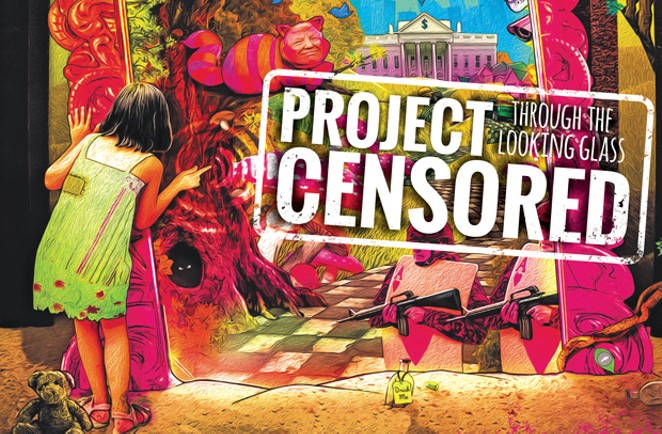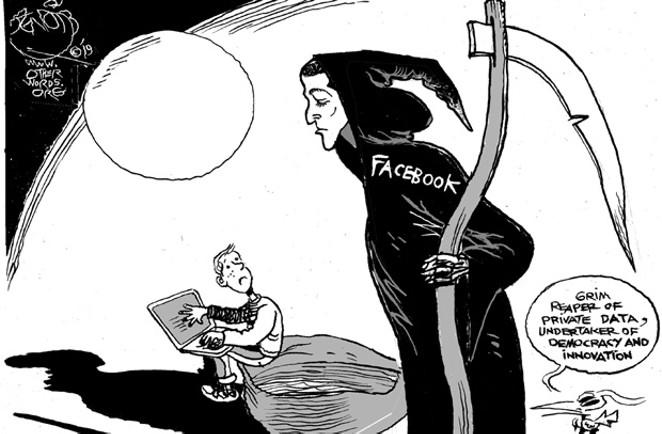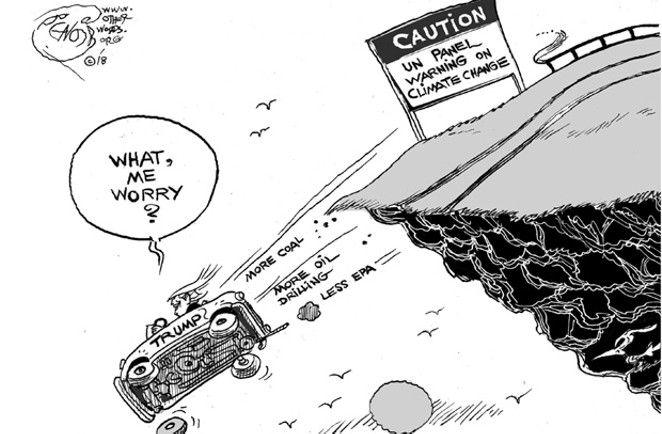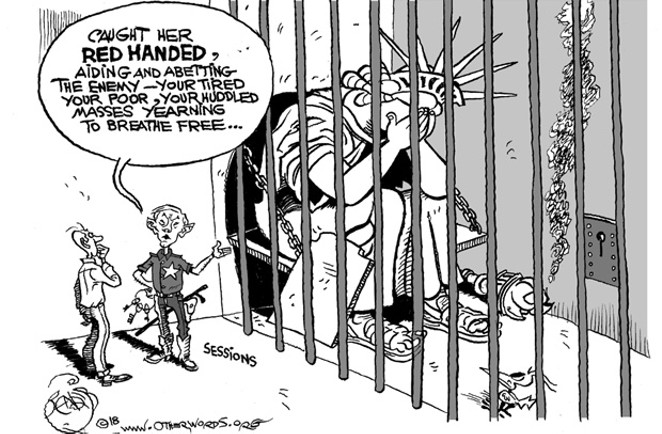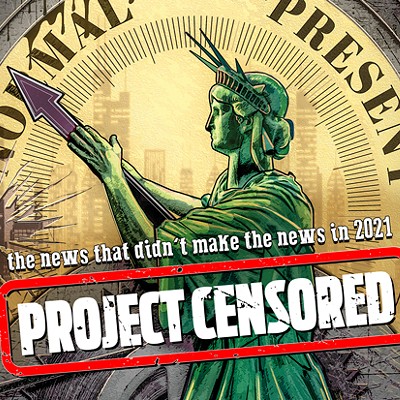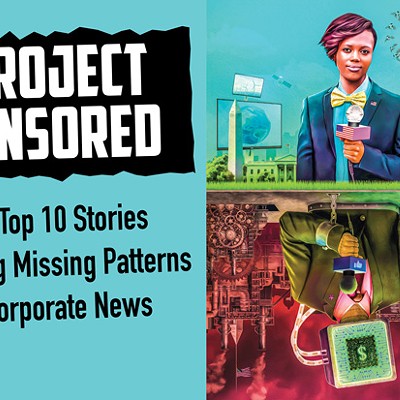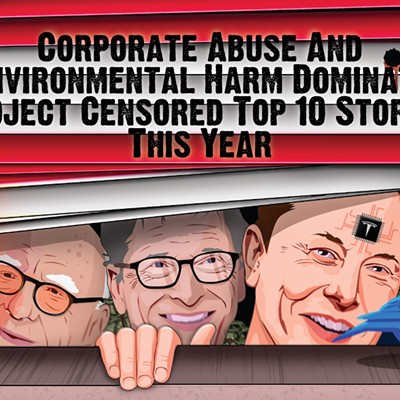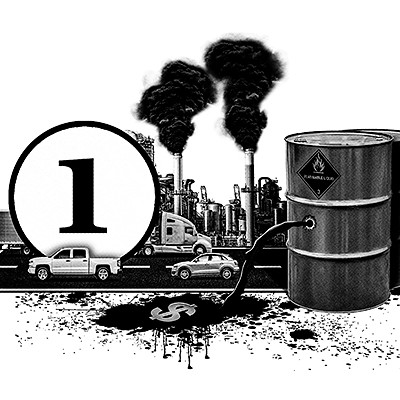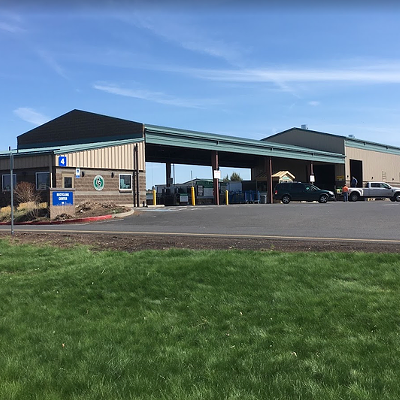Every year, Project Censored scours the landscape for the most important stories that the mainstream corporate media somehow missed and every year the task seems to get a bit stranger. Curiouser and Curiouser, as suggested in the subtitle of this year's volume of its work, Censored 2020: Through The Looking Glass, which includes its full list of the top 25 censored stories and more about the never-ending struggle to bring vitally important hidden truths to light.
1. Justice Department's Secret FISA Rules for Targeting Journalists
The federal government can secretly monitor American journalists under the Foreign Intelligence Surveillance Act, or FISA, which allows invasive spying and operates outside the traditional court system, according to two 2015 memos from then-Attorney General Eric Holder. The memos were obtained by The Knight First Amendment Institute at Columbia University and the Freedom of the Press Foundation through an ongoing Freedom of Information Act lawsuit, which was reported on by The Intercept, whose parent company provides funding for both organizations, but was virtually ignored by the corporate media.
The secret rules "apply to media entities or journalists who are thought to be agents of a foreign government, or, in some cases, are of interest under the broader standard that they possess foreign intelligence information," The Intercept reported.
"As Trevor Timm [executive director of Freedom of the Press] and others noted, FISA rules are "much less stringent" than the Justice Department's media guidelines for obtaining subpoenas, court orders, and warrants against journalists," Project Censored noted.
"This is a huge surprise," Victoria Baranetsky, general counsel with the Center for Investigative Reporting, told The Intercept. "It makes me wonder, what other rules are out there, and how have these rules been applied? The next step is figuring out how this has been used."
"Targeting journalists for surveillance, especially when trying to determine their sources, has historically been limited by First Amendment concerns," The Intercept noted. "(But in 2015) Holder instituted new guidelines that made the targeting of journalists in criminal cases a 'last resort,' and said that the Justice Department ordinarily needed to notify journalists when their records were seized, (following revelations) that the Obama administration had secretly seized phone records from the Associated Press and named a Fox News reporter as a co-conspirator in a leak case."
"The fact that these were kept secret during the Obama administration is cause for great concern," Timm noted. "Now, President Trump has repeatedly stated his hatred for the media, and his (former) Attorney General Jeff Sessions has already tripled the amount of leak investigations since the Obama era (when they were already at an all time high). Has the Trump administration used FISA court orders to target journalists with surveillance? If so, when?"
Project Censored cited three "concerning" questions the memos raise, according to Timm:
First, how many times have FISA court orders been used to target journalists, and are any currently under investigation? Second, why did the Justice Department keep these rules secret when it updated its "media guidelines" in 2015? And, third, is the Justice Department using FISA court orders—along with the FBI's similar rules for targeting journalists with National Security Letters (NSLs)—to "get around the stricter 'media guidelines'"?
FISA orders "allow the government to sidestep some of the Media Guidelines' most important protections," Knight Institute staff attorney Ramya Krishnan wrote at their website. "For example, the requirement that (1) the information sought be 'essential to a successful investigation, prosecution, or litigation'; (2) the requester make 'reasonable alternative attempts ... to obtain the information from alternative sources'; and (3) the government notify and negotiate with the affected journalist except in certain narrow circumstances."
The corporate media virtually ignored these revelations when they occurred.
The subsequent media interest in FISA warrants targeting Trump campaign adviser Carter Page "has done nothing at all to raise awareness of the threats posed by FISA warrants that target journalists and news organizations," Project Censored observed.
They ended with a quote from Krishnan, summarizing the stakes:
"National security surveillance authorities confer extraordinary powers. The government's failure to share more information about them damages journalists' ability to protect their sources, and jeopardizes the news gathering process."
2. Think Tank Partnerships Establish Facebook as a Tool of U.S. Foreign Policy
In the name of fighting "fake news" to protect American democracy from "foreign influences," Facebook formed a set of partnerships with three expert foreign influencers in 2018, augmenting its bias toward censorship of left/progressive voices.
In May 2018, Facebook announced its partnership with the Atlantic Council, a NATO-sponsored DC think tank to "monitor for misinformation and foreign interference."
"It's funded by the U.S. Department of State and the U.S. Navy, Army and Air Force, along with NATO, various foreign powers and major Western corporations, including weapons contractors and oil companies, (including Chevron, ExxonMobil, Royal Dutch Shell)," noted Adam Johnson, writing for the media watch group FAIR.
He went on to say:
When a venture that's supposedly meant to curb "foreign influence" is bankrolled by a number of foreign countries—including the United Arab Emirates, Britain, Norway, Japan, Taiwan and South Korea—one would think that would be worth noting. Nor should U.S. government money be exempt from the "foreign" qualifier with its suggestion of malicious influence; to most of Facebook's 2.2 billion users, after all, the United States is a foreign country.
What's more, Project Censored noted, its conservative-leaning board of directors includes former CIA directors, retired U.S. generals and hawkish former state department officials like Henry ["Secret War In Cambodia"] Kissinger and Condoleezza ["Iraq Weapons of Mass Distruction"] Rice. These are not exactly people most journalists would want as editorial overseers.
"The U.S. government reserves the right to run unattributed propaganda on Facebook, and there's much evidence they have," FAIR noted, parenthetically. "Needless to say, the Atlantic Council's Digital Forensic Research Lab hasn't done any work in this space."
It went on to note that the major news outlets covering the story said nothing about any of the above conflicts of interest.
"Instead, they issued repackaged press releases on the partnership, never examining the motives of the D.C. think tank, its funders, or the broader premise that 'fake news' and 'foreign meddling' were something in need of combating."
Such uncritical recycling of press releases is nothing more than propaganda.
"Much like 'counter-espionage' is another name for espionage, 'counter-propaganda' efforts are just propaganda efforts," FAIR noted,
Then in September, Facebook announced it would also partner with two Cold War-era U.S. government-funded propaganda organizations: the National Democratic Institute and the International Republican Institute.
"That these two U.S. government creations, along with a NATO offshoot like the Atlantic Council, are used by Facebook to distinguish real from fake news is effectively state censorship," noted Alan MacLeod, writing for FAIR. "The [National Democratic Institute] undermined the Sandinista government of Nicaragua in the 1980s, and continues to do so to this day, while the IRI claimed a key role in the 2002 coup against leftist President Hugo Chávez of Venezuela."
"In the name of fighting the scourge of 'fake news,' Facebook altered its proprietary algorithms in ways that significantly reduced traffic to progressive websites such as Common Dreams and Slate," Project Censored noted. "Without formal warning, Facebook shut down leftwing, Venezuela-linked Facebook pages such as TeleSur English and Venezuelanalysis (although both were reinstituted after protests about their removal)."
In October 2018, Jonathan Sigrist, writing for Global Research, described one of the greatest Facebook account and page purges in its troubled history: "559 pages and 251 personal accounts were instantly removed from the platform.... This is but one of similar yet smaller purges that have been unfolding in front of our eyes over the last year, all in the name of fighting 'fake news' and so called 'Russian propaganda.'"
He also noted: "Many of the pages and accounts taken down have been political (often leftist), anti-war, independent journalists and media outlets that are known to go against the grain of mainstream media outlets. Anti-Media (antimedia.com), a reputable source of independent journalism, saw its page with over 2 million followers taken down overnight with no concrete explanation as to why."
"There has been very little corporate news coverage of Facebook's partnerships with U.S. government propaganda organizations," Project Censored noted. "CNN, Fox News, and NBC News have provided offhand coverage, with only the most basic information, but none have framed Facebook's actions in terms of censorship."
3. Indigenous Groups from Amazon Propose Creation of Largest Protected Area on Earth
When news of unprecedented wildfires in the Amazon grabbed headlines in late August, most Americans were ill-prepared to understand the story, in part because of systemic exclusion of indigenous voices and viewpoints, highlighted in Project Censored's number three story — the proposed creation of an Amazonian protected zone the size of Mexico, presented to the UN Conference on Biodiversity in November 2018.
The proposal, which Jonathan Watts, writing for The Guardian described as "a 200m-hectare sanctuary for people, wildlife and climate stability that would stretch across borders from the Andes to the Atlantic," was advanced by an alliance of some 500 indigenous groups from nine countries, known as COICA — the Coordinator of the Indigenous Organizations of the Amazon Basin, who called it, "a sacred corridor of life and culture."
"We have come from the forest and we worry about what is happening," declared Tuntiak Katan, vice president of COICA, quoted in The Guardian. "This space is the world's last great sanctuary for biodiversity. It is there because we are there. Other places have been destroyed."
The Guardian went on to note:
The organisation does not recognise national boundaries, which were put in place by colonial settlers and their descendants without the consent of indigenous people who have lived in the Amazon for millennia. Katan said the group was willing to talk to anyone who was ready to protect not just biodiversity but the territorial rights of forest communities.
In contrast, The Guardian explained:.
Colombia previously outlined a similar triple-A (Andes, Amazon and Atlantic) protection project that it planned to put forward with the support of Ecuador at next month's climate talks. But the election of new rightwing leaders in Colombia and Brazil has thrown into doubt what would have been a major contribution by South American nations to reduce emissions.
And it went on to note that Bolsonaro had said he would only stay in the Paris climate agreement if given guarantees of Brazilian sovereignty over indigenous land. A follow-up story at Common Dreams, quoted another COICA representative, Juan Carlos Jintiach, saying Bolsonaro's comments "are concerning because they nurture a disturbing tendency in different parts of the world, where almost three-fourths of environmental defenders assassinated in 2017 were indigenous leaders."
Project Censored noted that: "Although the corporate and independent press have covered rightwing president Jair Bolsonaro's intent to undermine indigenous rights in order to open Amazonian land for development, this coverage has almost entirely ignored COICA's proposal to create the world's largest protected area."
It cited two New York Times stories, one in January 2019, which made no mention of the proposal, and a March 2109 op-ed that included just one sentence, "noting simply that Bolsonaro's election 'calls into question the fate of their proposal," and linking to The Guardian's November 2018 report.
4. U.S. Oil and Gas Industry Set to Unleash 120 Billion Tons of New Carbon Emissions
Three months after the United Nations' Intergovernmental Panel on Climate Change warned that we have just 12 years to limit catastrophic climate change, Oil Change International released a report that went virtually ignored, warning that the United States was headed in exactly the wrong direction. The report, Drilling Towards Disaster, warned that rather than cutting down carbon emissions, as required to avert catastrophe, the United States under Donald Trump was dramatically increasing fossil fuel production, with the United States on target to account for 60% of increased carbon emissions worldwide by 2030, expanding extraction at least four times more than any other country.
"Between 2018 and 2050, the United States is set to unleash the world's largest burst of CO2 emissions," the report also warned. "U.S. drilling into new oil and gas reserves – primarily shale – could unlock 120 billion metric tons of CO2 emissions, which is equivalent to the lifetime CO2 emissions of nearly 1,000 coal-fired power plants."
"To limit catastrophic climate change, governments must manage the decline of the fossil fuel industry, and do so over the next few decades," the report noted. "The United States should be moving first and fastest in this direction, (both because it's) the world's largest oil and gas producer and third-largest coal producer (and because) [i]t also has the resources and technology at hand to rapidly phase out extraction while investing in a just transition that guarantees a 'Green New Deal' for affected workers and communities currently living on the front lines of the fossil fuel industry and its pollution."
References to the report "have been limited to independent media outlets," Project Censored noted. "Corporate news outlets have not reported on the report's release or its findings, including its prediction of 120 billion tons of new carbon pollution or its five-point checklist to overhaul fossil fuel production in the US."
The checklist includes:
1. Ban new leases or permits for new fossil fuel exploration, production, and infrastructure;
2. Plan for the phase-out of existing fossil fuel projects in a way that prioritizes environmental justice;
3. End subsidies and other public finance for the fossil fuel industry;
4. Champion a Green New Deal that ensures a just transition to 100% renewable energy; and
5. Reject the influence of fossil fuel money over U.S. energy policy.
"[Instead of paying attention to the report, corporate media's carbon emissions coverage] has focused more narrowly on President Trump's proposal to amend existing emissions standards for passenger cars and light trucks and to establish new standards for future cars and trucks," Project Censored noted. "[But] framing carbon emissions in terms of pollution from cars and trucks does not convey the extent of the problem. Instead, this frame effectively excludes from coverage the scope of new fossil fuel exploration, production, and extraction that led Oil Change International to characterize the potential for massive new carbon emissions as an 'existential emergency' for U.S. lawmakers."
5. Modern Slavery in the United States, Around the World
An estimated 403,000 people in the U.S. were living in conditions of "modern slavery" in 2016, according to the 2018 Global Slavery Index, or GSI, about 1% of the global total. The GSI defines "modern slavery" broadly to include forced labor and forced marriage.
"[But the United States plays an outsized role] because the U.S exacerbates the global slavery problem by importing products, including laptops, computers, mobile phones, garments, fish, cocoa and timber, at risk of being produced through forced labor," reported by Edward Helmore for The Guardian in July 2018, when the report was released.
Because forced marriage accounts for 15 million people, more than a third of the global total, it's not surprising that females form a majority of the victims (71 percent). The highest levels were found in North Korea, where an estimated 2.6 million people — 10% of the population — are victims of modern slavery.
The GSI is produced by the Walk Free Foundation, whose founder, Andrew Forrest, called the U.S. figure, "a truly staggering statistic, (which) is only possible through a tolerance of exploitation."
"Walk Free's methodology includes extrapolation using national surveys, databases of information of those who were assisted in trafficking cases, and reports from other agencies like the UN's International Labour Organization," explained The Guardian, to compile its figures.
There are problems with this, according to others working in the field, The Guardian noted. There's no universal legal definition, and tabulation difficulties abound. But the GSI addresses this as an issue for governments to work on and offers specific proposals.
"The GSI noted that forced labor occurred 'in many contexts' in the US, including in agriculture, among traveling sales crews, and—as recent legal cases against GEO Group, Inc. have revealed—as the result of compulsory prison labor in privately owned and operated detention facilities contracted by the Department of Homeland Security," Project Censored noted. "It also points out that migrants — especially migrant women and children — are "particularly vulnerable (in the United States) due to a variety of factors including immigration status, lack of familiarity with U.S. employment protections, and because migrants often work in jobs that are 'hidden from the public view and unregulated by the government.'"
Newly restrictive immigration policies have further increased the vulnerability of undocumented persons and migrants to modern slavery.
In addition, GSI report on the United States cited three legislative priorities:
Enact federal legislation criminalizing forced marriage.
Raise the minimum age for marriage, with or without parental consent to 18 in all states.
Extend legislation prohibiting criminalization of child victims of trafficking to all states.
And called for specific improvements in victim support and to address risk factors. For example:
Enforce core labor laws and labor standards for most vulnerable workers, including undocumented or seasonal workers in the United States from Latin and Central America.
Project Censored notes the 2018 GSI "received limited coverage" in the corporate media, citing the New York Times, CNN and CBS News. The Times featured the case of a former North Korean slave now attending Columbia University, "leaving details about the prevalence of slavery in the U.S. to the article's later paragraphs. CNN noted that the report listed the U.S. as 'a world leader' in addressing forced labor in supply chains, while CBS News reported that 'the U.S. does better than most countries in tackling the issue.'"
6. Survivors of Sexual Abuse and Sex Trafficking Criminalized for Self-Defense
On Jan. 7, outgoing Tennessee Gov. Bill Haslam granted clemency to Cyntoia Brown, who had been sentenced to life in prison in 2004, at age 16, for killing a man who bought her for sex and raped her. Brown's case gained prominence via the support of A-list celebrities and Haslam cited "the extraordinary steps Ms. Brown has taken to rebuild her life." But despite public impressions, Brown's case was far from unique.
"There are thousands of Cyntoia Browns in prison," organizer Mariame Kaba, co-founder of Survived and Punished, told Democracy Now! the next day.
"We should really pay attention to the fact that we should be fighting for all of those to be free," Kaba said. "When you look at women's prisons, the overwhelming majority, up to 90 percent of the people in there, have had histories of sexual and physical violence prior to ending up in prison."
"In contrast to the spate of news coverage from establishment outlets, which focused on Brown's biography and the details of her case," Project Censored wrote, "independent news organizations, including The Guardian, Democracy Now!, Rolling Stone and Mother Jones, stood out for reporting that cases like Brown's are all too common."
Kaba also wrote The Guardian story referred to, Project Censored noted:
Tracing back to myths that arose in the 19th century during slavery , Kaba noted in her The Guardian article that black women "have always been vulnerable to violence" in the US and "have long been judged as having 'no selves to defend.'" Today, she wrote, self-defense laws that are "interpreted generously" when applied to white men threatened by men of color are often interpreted "very narrowly" when women of color and gender non-conforming people invoke them in domestic violence and sexual assault cases.
Later in January, Kellie Murphy's Rolling Stone story quoted Alisa Bierria, another Survived and Punished co-founder, and highlighted several other cases prominent in alternative media coverage. In May, Mother Jones reported on the legislative progress that Survived and Punished and its allies had achieved in advancing state and federal legislation.
"The bills in Nevada, Arkansas, Hawaii and Congress, which are based on model legislation and use similar language, would do away with mandatory minimum sentencing requirements for child sex trafficking victims who perpetrate crimes against their abusers," Olivia Exstrum reported for Mother Jones. "Currently, state and federal laws don't give special consideration to such cases, meaning juvenile victims who commit the most serious crimes, like murder, are often tried in adult court with the possibility of decades behind bars."
"A growing body of research has shown that the trauma that arises from being sex trafficked can affect decision-making, especially in young people," but that, historically, "that trauma has not been well understood and hasn't been taken into account when deciding the cases of victims who commit crimes," Mother Jones went on to note.
"Corporate news organizations provided considerable coverage of Cyntoia Brown's clemency," Project Censored noted. "However, many of these reports treated Brown's case in isolation, emphasizing her biography or the advocacy on her behalf by celebrities such as Rihanna, Drake, LeBron James, and Kim Kardashian West."
It went on to cite examples from The New York Times and NBC News that did take a broader view, but failed to focus on sex trafficking or sexual violence.
"Reports that did link Cyntoia Brown's case to broader patterns of sexual violence and sex trafficking were often filed as opinion pieces, rather than news stories," Project Censored noted. singling out "one exceptionally detailed piece, written by Andrea Powell and published by NBC News."
Powell is the founder and executive director of Karana Rising, a nonprofit that supports survivors of human trafficking, and made several points similar to Kaba's, so there is some awareness of the larger story in corporate media culture. But it hasn't crossed over from opinion pieces to news coverage.
7. Flawed Investigations of Sexual Assaults in Children's Immigrant Shelters
"Over the past six months, ProPublica has gathered hundreds of police reports detailing allegations of sexual assaults in immigrant children's shelters," ProPublica reported in November 2018. "[The shelters] have received $4.5 billion for housing and other services since the surge of unaccompanied minors from Central America in 2014 [and the reports reveal that] both staff and other residents sometimes acted as predators."
"Again and again, the reports show, the police were quickly — and with little investigation — closing the cases, often within days, or even hours," ProPublica stated.
In the case of Alex (a 13-year-old from Honduras) used to highlight systemic problems, the police investigation lasted 72 minutes, and resulted in a three sentence report. There was surveillance video showing two older teenagers grabbing him, throwing him to the floor and dragging him into a bedroom. But ProPublica reported, "An examination of Alex's case shows that almost every agency charged with helping Alex — with finding out the full extent of what happened in that room — had instead failed him."
"Because immigrant children in detention are frequently moved, even when an investigator wanted to pursue a case, the child could be moved out of the investigating agency's jurisdiction in a just few weeks, often without warning," Project Censored noted. "When children are released, parents or relatives may be reluctant to seek justice, avoiding contact with law enforcement because they are undocumented or living with someone who is."
Then, in February 2019, Axios reported, "Thousands of allegations of sexual abuse against unaccompanied minors in the custody of the U.S. government have been reported over the past 4 years, according to Department of Health and Human Services (HHS) documents given to Axios by Rep. Ted Deutch's office." This included 4,556 complaints received by the HHS' Office of Refugee Resettlement, and 1,303 complaints received by the Department of Justice.
Project Censored noted that there had been some corporate news coverage, including CBS News and The New York Times, "However, in contrast with ProPublica's coverage, these reports have not highlighted shortcomings in investigations of alleged sexual abuse or the lack of support for survivors after the abuse."
8. US Women Face Prison Sentences for Miscarriages
"There has to be some form of punishment" for women who have abortions, candidate Donald Trump said in early 2016, which led to a wave of denials from anti-abortion activists and politicians, who claimed it was not their position. These women were victims, too, they argued: That had always been their position. But that wasn't true, as Rewire News reported at the time. Women were already in prison, not for abortions, but for miscarriages alleged to be covert abortions. And that could become much more widespread due to actions taken by Trump Administration, according to a 2019 Ms. Magazine blog post by Naomi Randolph on the 46th anniversary of the Roe v. Wade decision, especially if the decision is overturned.
"[P]regnant women could face a higher risk of criminal charges for miscarriages or stillbirths, due to lawmakers in numerous states enacting laws that recognize fetuses as people, separate from the mother," Project Censored explained, adding:
One example that Randolph provided is in Alabama, where voters recently passed a measure that "endows fetus' with 'personhood' rights for the first time, potentially making any action that impacts a fetus a criminal behavior with potential for prosecution." Collectively, these laws have resulted in hundreds of American women facing prosecution for the outcome of their pregnancies.
In fact, a 2015 joint ProPublica/AL.com investigation, found that "at least 479 new and expecting mothers have been prosecuted across Alabama since 2006," under an earlier child endangerment law, passed with meth lab explosions in mind, which the "personhood movement" got repurposed to target stillbirths, miscarriages and suspected self-abortions.
Cases vary across states, but "the commonality is women losing their rights if they are thought to be endangering the fetus," Project Censored noted. "As Randolph detailed, this especially hurts women of color and low-income women, due to their lack of access to contraceptives, abortion, and treatment for mental health conditions or addiction." And things could get much worse if Roe v. Wade is overturned:
The Trump administration has been combative to women's reproductive rights from day one. As Naomi Randolph explained, proposed policy changes to the Affordable Care Act that would "allow employers to deny women no-cost birth control based on their religious and 'moral' beliefs." This followed proposals to change Title X, which could limit funding to family planning services like Planned Parenthood. The research shows that if access to birth control is diminished, the rates of unintended pregnancies will rise. Trump's Supreme Court Justice appointee, Brett Kavanaugh, is the fifth vote necessary to strike down Roe v. Wade. If that happens, women could not only face prosecution for seeking out abortions, but also lose basic protections when they are pregnant and parenting.
Project Censored cited the The New York Times is as "the only corporate source that has discussed this topic," but only in opinion pieces, "rather than as a topic featured in headlines and news stories," adding, "This issue has mainly been covered by independent news sources such as Ms. Magazine and Rewire News."
9. Developing Countries' Medical Needs Unfulfilled by Big Pharma
"The world's biggest pharmaceutical firms have failed to develop two-thirds of the 139 urgently needed treatments in developing countries," Julia Kollewe reported for The Guardian in November 2018, according to a report by Access to Medicine Foundation, which "found that most firms focus on infectious diseases such as HIV/Aids, malaria and tuberculosis but had failed to focus on other serious ailments..... In particular, the foundation called for an infants' vaccine for cholera and a single-dose oral cure for syphilis."
"An estimated two billion people globally lack access to urgently needed medicines," Project Censored noted, "Of the 139 drugs, vaccines, and diagnostic tests identified as urgently needed by the World Health Organization, 91 have not been developed by any of the pharmaceutical firms tracked by the report. Sixteen of WHO's prioritized diseases have 'no projects at all,' The Guardian reported."
"Diseases with the least attention include; several haemorrhagic fevers; several parasitic worm diseases; syphilis; cholera and diarrhoea caused by E coli," the Guardian noted. "For the first time, cancer is included in the study. It found that cancer is taking an increasing toll in low to middle-income countries where more than half of global deaths caused by cancer now occur, because people tend to live longer, move to cities and adopt western lifestyles."
"Just a handful of companies (GSK, Johnson & Johnson, France's Sanofi and Merck) are carrying out 63% of the most urgently needed research & development projects; GSK alone accounts for one third," The Guardian reported.
"The fact that a handful of companies are carrying the bulk of the priority R&D load shows how fragile the situation is," Access to Medicine's executive director said. "A retreat by even one of these players would have a significant impact."
It's not all bad news. "The foundation's report also highlighted 45 best and innovative practices that could 'help raise the level of standard practice' and 'achieve greater access to medicine,'" Project Censored noted. "The report highlights examples such as the development of a child-friendly chewable tablet for roundworm and whipworm, which infect an estimated 795 million people," The Guardian reported. "Johnson & Johnson has pledged to donate 200m doses a year until 2020." The possibilities underscore why attention is vital.
Attention makes a difference, Project Censored pointed out:
In an effort to mobilize investors to pressure pharmaceutical companies to make more medicines available to developing countries, the foundation presented the findings of its reports to 81 global investors at events in London, New York, and Tokyo. As of April 2019, Access to Medicine reported that, since the release of the 2018 Access to Medicine Index in November 2018, ninety major investors had pledged support of its research and signed its investor statement.
But attention has been sorely lacking in the corporate media. "With the exception of a November 2018 article by Reuters, news of the Access to Medicine Index's findings appear to have gone unreported in the corporate press," Project Censored concluded.
10. Pentagon Aims to Surveil Social Media to Predict Domestic Protests
"The United States government is accelerating efforts to monitor social media to preempt major anti-government protests in the US," Nafeez Ahmed reported for Motherboard in October 2018, drawing on "scientific research, official government documents, and patent filings." Specifically, "The social media posts of American citizens who don't like President Donald Trump are the focus of the latest US military-funded research," which in turn "is part of a wider effort by the Trump administration to consolidate the US military's role and influence on domestic intelligence."
The Pentagon had previously funded Big Data research into predicting mass population behavior, "specifically the outbreak of conflict, terrorism, and civil unrest," especially in the wake of the Arab Spring, via a program known as "Embers." But such attention wasn't solely focused abroad, Ahmed noted, calling attention to a US Army-backed study on civil unrest within the US homeland, titled "Social Network Structure as a Predictor of Social Behavior: The Case of Protest in the 2016 US Presidential Election."
Ahmed discussed two specific patents which contribute to ""a sophisticated technology suite capable of locating the "home" position of users to within 10 kilometers for millions of Twitter accounts, and predicting thousands of incidents of civil unrest from micro-blogging streams on Tumblr."
"Although these technologies were developed under the Obama administration, it appears their use is being accelerated by the Trump administration," Ahmed noted, "and by moving the Embers program to which these technologies relate into the private sector, this acceleration is occurring in a way that sits beyond public scrutiny or accountability."
What's more, "This kind of technology-enabled surveillance of social media will likely suppress dissent and lead to biased targeting of racial and religious minorities," ACLU senior staff attorney Hugh Handeyside told Motherboard. ""We need to know much more about any proposed policies or programs and their effect on rights that the Constitution protects."
In addition, Project Censored noted:
Ahmed's report highlighted official government documents focused on domestic surveillance, including an updated doctrine on "Homeland Defense" issued by the US Joint Chiefs of Staff in April 2018. The new doctrine, Ahmed reported, "underscores the extent to which the Trump administration wants to consolidate homeland defense and security under the ultimate purview of the Pentagon."
Their report concluded by noting:
According to Ahmed's Motherboard report, "Taken in tandem with the US military's sudden interest in predicting anti-Trump protests after the 2016 elections, the Pentagon's upgraded homeland defense doctrine seems to be part of a wider effort by the Trump administration to prepare for domestic civil unrest in coming months and years."
Project Censored made no mention of any coverage of this story by the corporate media.

